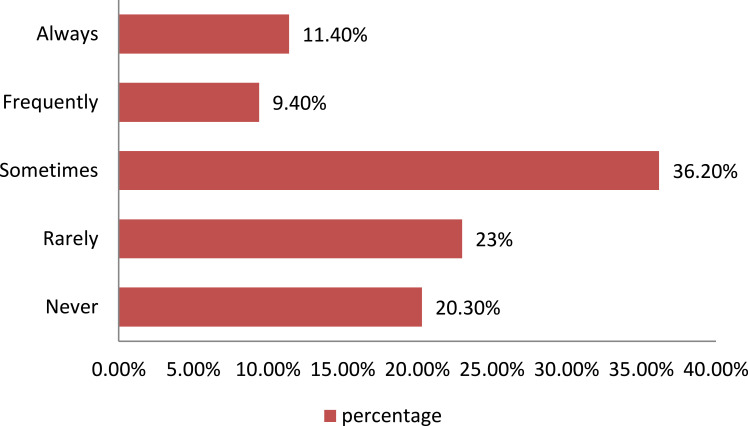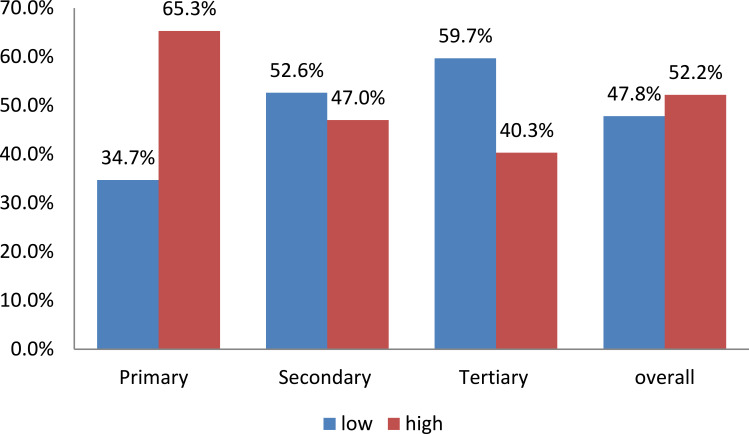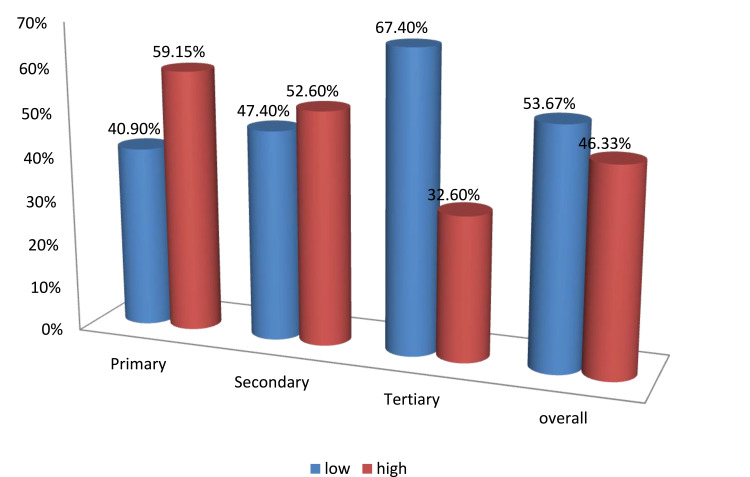The Relationship Between Organizational Commitment and Organizational Justice Among Health Care Workers in Ethiopian Jimma Zone Public Health Facilities.
IF 3.4
Q1 HEALTH POLICY & SERVICES
Journal of Healthcare Leadership
Pub Date : 2022-02-03
eCollection Date: 2022-01-01
DOI:10.2147/JHL.S345528
引用次数: 5
Abstract
Background The healthcare service sector is confronting a global labor shortage. Despite this fact, health care professionals are still highly vulnerable to organizational injustice, which negatively influence organizational commitment, putting an additional burden on the health sector. Thus, this study aimed to investigate the correlation between organizational commitment and organizational justice among health care workers. Methods Facility-based cross-sectional study design was conducted among 395 health care professionals in the Jimma zone. Four Hospitals and 10 health centers were involved in the study randomly. The sample was distributed proportionally based on the number of health care workers. To select individuals, a systematic random sampling method was employed. Data were collected through self-report questionnaire using modified Alan and Mayer scale to measure organizational commitment and Niehoff and Moorman scale to measure organizational justice. The validity of the tools was checked using the reliability coefficient alpha and it was >0.7. The collected data were cleaned and entered into EpiData software version 3.1 and exported to SPSS version 20 for analysis. Descriptive and inferential statistics were done. Results This study revealed that 212 (53.7%) of the respondents scored a low level of organizational commitment. About half of the participants, 202 (52.2%), judged organizational justice were fair. All organizational justice dimensions showed a positive and significant correlation with all organizational commitment dimensions. Thus, the finding revealed that overall organizational commitment and organizational justice had a strong and positive correlation (r = 0.695**, P < 0.01). From the regression analysis distributive justice (B = 0.382, 95% CI: 0.31–0.45), and procedural justice (B = 0.17, 95% CI: 0.06–0.283) were among the factors affecting organizational commitment. Conclusion and Recommendation This study showed a strong link between organizational commitment and organizational justice. This suggests that organizational justice has been recognized as a motivator and factor influencing health care workers’ organizational commitment. As a result, enhancing organizational justice can help to maintain the commitment of healthcare workers and the facility’s capabilities.



埃塞俄比亚吉玛区公共卫生机构医护人员组织承诺与组织公正的关系
背景:医疗保健服务部门正面临全球劳动力短缺。尽管如此,卫生保健专业人员仍然极易受到组织不公正的影响,这对组织承诺产生负面影响,给卫生部门带来额外负担。因此,本研究旨在探讨医护人员组织承诺与组织公平的关系。方法:采用基于设施的横断面研究设计,对吉马地区395名卫生保健专业人员进行调查。4家医院和10家保健中心被随机纳入研究。样本根据卫生保健工作者的数量按比例分布。在个体的选择上,采用系统随机抽样的方法。采用改进的Alan and Mayer量表测量组织承诺,Niehoff and Moorman量表测量组织公正,通过自我报告问卷收集数据。使用信度系数alpha检验工具的有效性,其值>0.7。将收集到的数据进行清洗,输入EpiData 3.1版软件,导出到SPSS 20版进行分析。进行了描述性和推断性统计。结果:本研究发现,212名(53.7%)受访者的组织承诺得分较低。大约一半的参与者,202人(52.2%)认为组织公正是公平的。组织公平各维度与组织承诺各维度呈显著正相关。整体组织承诺与组织公平感呈显著正相关(r = 0.695**, P < 0.01)。从回归分析来看,分配公正(B = 0.382, 95% CI: 0.31-0.45)和程序公正(B = 0.17, 95% CI: 0.06-0.283)是影响组织承诺的因素。结论与建议:本研究显示组织承诺与组织公平之间有很强的关联性。这表明组织公正已被认为是影响医护人员组织承诺的激励因素和因素。因此,加强组织公正有助于保持卫生保健工作者的承诺和机构的能力。
本文章由计算机程序翻译,如有差异,请以英文原文为准。
求助全文
约1分钟内获得全文
求助全文
来源期刊

Journal of Healthcare Leadership
HEALTH POLICY & SERVICES-
CiteScore
5.40
自引率
2.30%
发文量
27
审稿时长
16 weeks
期刊介绍:
Efficient and successful modern healthcare depends on a growing group of professionals working together as an interdisciplinary team. However, many forces shape the delivery of healthcare; changes are being driven by the markets, transformations in concepts of health and wellbeing, technology and research and discovery. Dynamic leadership will guide these necessary transformations. The Journal of Healthcare Leadership is an international, peer-reviewed, open access journal focusing on leadership for the healthcare professions. The publication strives to amalgamate current and future healthcare professionals and managers by providing key insights into leadership progress and challenges to improve patient care. The journal aspires to inform key decision makers and those professionals with ambitions of leadership and management; it seeks to connect professionals who are engaged in similar endeavours and to provide wisdom from those working in other industries. Senior and trainee doctors, nurses and allied healthcare professionals, medical students, healthcare managers and allied leaders are invited to contribute to this publication
 求助内容:
求助内容: 应助结果提醒方式:
应助结果提醒方式:


